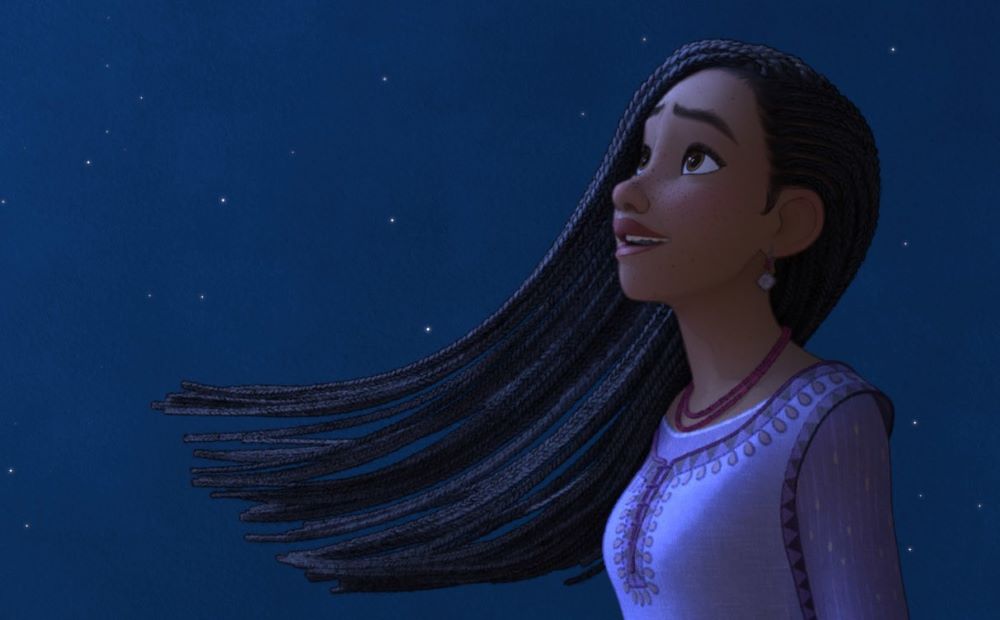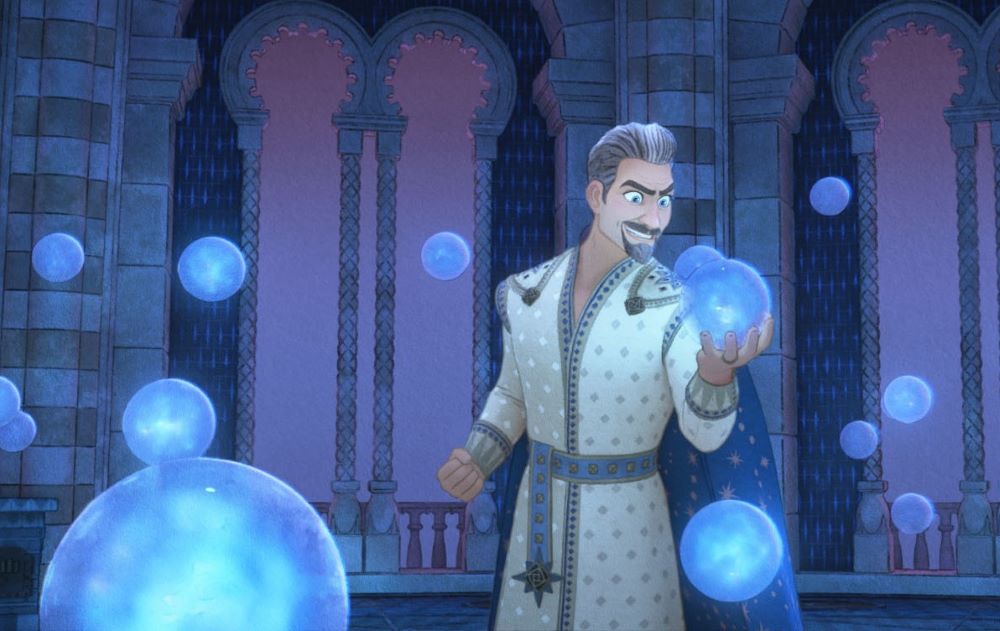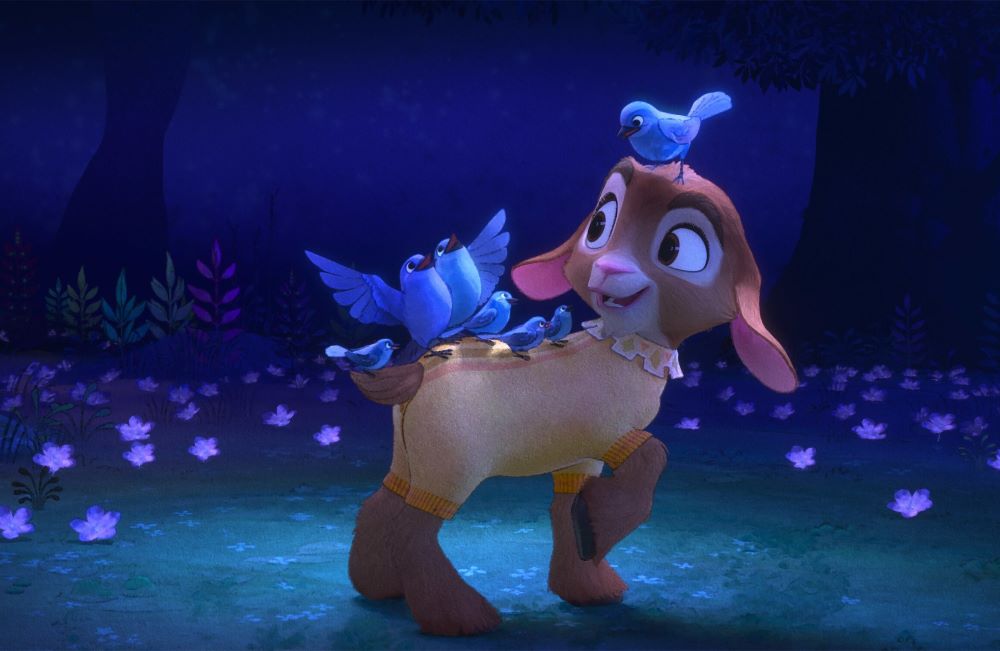
In Disney's "Wish," Asha (Ariana DeBose) learns that the magical kingdom Rosas is built on a lie. The new movie celebrates Disney's 100th anniversary. (Courtesy of ©Disney)
Editor's note: This review contains spoilers.
Disney doesn't technically have a monopoly on wishing on stars. People have been gazing up at the heavens since the dawn of time. But ever since a little green insect named Jiminy Cricket sang "When You Wish Upon A Star" in the 1940 animated film "Pinocchio," there has been no shortage of Disney characters whose destinies have become caught up with great balls of gas.
Peter Pan lives just past the second star to the right. Tiana ("The Princess and the Frog") begrudgingly bets her whole career on a star. Simba ("The Lion King") speaks with the star-bound memory of his father. Jim Hawkins ("Treasure Planet") dreams of exploring the stars. Lilo's ("Lilo & Stitch") world is turned upside down by a visitor from the stars. And Rapunzel ("Tangled") finds herself so drawn to starlike floating lights that she can't help but set off for adventure. And so on and so on.
When you wish upon a star in a Disney animated movie, things happen. And as a result, that cultural earworm evokes in many of us images of beloved childhood characters and moments of glimmering magic.
It's no surprise, then, that to celebrate the 100th anniversary of Disney storytelling, the studio made an explicit turn to wishing and stars in the latest animated feature film, "Wish."

Disney's "Wish" takes place in the magical kingdom of Rosas, where each citizen, on their 18th birthday, gives their heart’s greatest wish to their ruler, King Magnifico (Chris Pine), for safekeeping. (Courtesy of ©Disney)
The story takes place in a magical kingdom called Rosas, where each citizen, on their 18th birthday, gives their heart's greatest wish to their ruler, King Magnifico (Chris Pine), for safekeeping. The wish is then forgotten, allowing the citizens to live their lives untroubled by those deep, pestering desires. That is, unless Magnifico decides to grant the wish, fulfilling one person's dreams and leaving all the others in hopeful expectation.
While the scope of Magnifico's powers are a bit unclear, his own origin story is a tragic one — riddled by loss and death and a determination to build a place where no one else would suffer what he did — so he seems like a decent enough guy. Until would-be apprentice Asha, wonderfully brought to life by Ariana DeBose, stumbles upon a startling truth: Rosas is built on a lie.
Each citizen gives their wish trusting that it might one day be granted. But Magnifico has both magical and discretionary power; he's the only one able to grant a wish and the only one who decides which wish to grant. It's not a random process. It's an intentional one. And that means there are countless wishes floating around in his office that he has determined will never again see the light of day, let alone fulfillment.
How could he lead people on? Asha wonders. How could Magnifico deceive so many? Why not at least give people back their wishes so they might pursue them the old-fashioned, non-magic way?
When we wish upon a star, we don't just look externally, hoping something happens to us. We wish upon ourselves, upon one another. We act. We bring about the world we hope to see.
Asha's questions earn Magnifico's disdain. She flees her home in favor of an old tree on which she used to sit and dream with her late father. It's there that she makes the titular wish upon a star, and that star decidedly answers.
And in true Disney fashion, things happen.
Asha rallies her friends to free the wishes. Magnifico responds to the threat of the star's power by dabbling in dark magic. And our heroes are saved in the very last moment by believing just a little harder in themselves and each other. Everyone gets a happy ending — and Magnifico gets trapped in the potential for a sequel.
But here's what struck me about the story of "Wish." That happy ending didn’t see the fulfillment of any wishes. That wish on a star didn't turn anyone into a princess, didn't lead anyone to fall in love, didn't turn any puppets into real boys or give mermaids human legs.
The happy ending of "Wish" was happy solely because it meant the citizens of Rosas could now pursue their own dreams. They were given the chance. It was about opportunity not outcome, journey not the destination.
There was a telling moment in Asha's home earlier in the film. Asha had learned the hard truth about Magnifico and had even managed to liberate her grandfather's wish. The old man, Sabino (Victor Garber) — coincidentally, also turning 100 — was deeply moved to look upon his own wish: a simple desire to inspire the next generation.

Disney's "Wish" features singing and dancing animals, including the goat Valentino (Alan Tudyk). (Courtesy of ©Disney)
But the joy turns to sorrow when Magnifico appears and literally pops Asha's mother’s wish. Sakina (Natasha Rothwell) is visibly stricken when her wish is destroyed. She doubles over in grief. It's a grief she hadn't felt since … She trails off. I left the film under the impression that the loss of her wish was akin to the loss of her husband. And what a deep grief that must have been.
These wishes aren't the souls of Rosas' citizens — their destruction doesn't kill their owner — but they are an integral part of each person. And this idea that their loss is on par with the loss of a loved one says something important: Wishes aren't people. But wishes are possibilities, pointing us to the person you or I might yet become. And the loss or suppression of that potential, of that part of ourselves, of who we might yet be for the world? That is devastating.
Advertisement
Should we hand over our deepest desires to questionable rulers in exchange for supposed protection? No. No, we shouldn't. But that's not the only moral of "Wish." In a classic of the genre, a whole forest of talking animals sings about how we're all stars; we're all made of star stuff. So, when we wish upon a star, we don't just look externally, hoping something happens to us. We wish upon ourselves, upon one another. We act. We bring about the world we hope to see.
"Wish" is no theological treatise. But if allowed, it might remind us that God is present in all things, in all of us. That God, too, wants things to happen in our stories, in our world. That God's presence in all of us necessarily unites all of us. And that our deepest desire, our wish, is God's very self within us, dreaming about who we might yet be — no stars necessary.
And that's not a wish we should ever suppress or give away. That's a wish we should share with the world.





